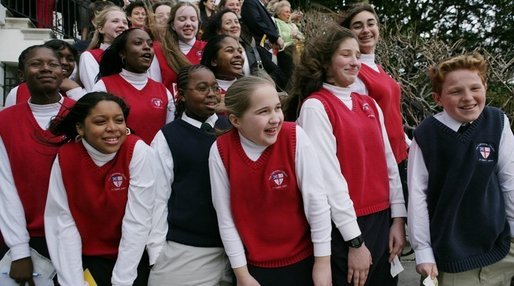I am not Catholic and I have never worked in a Catholic school. I’d always known there are urban Catholic schools with a mission very similar to Bellwether’s, but the schools themselves were somewhat of a black box to me. I haven’t been for or against Catholic schools — just indifferent (or agnostic?). Knowing that Catholic schools are by far the largest group of private schools in the world, this felt like a miss.
However, I’ve been on a sort of Catholic school pilgrimage over the past two years. I’ve built a close relationship with Bellwether client Partnership Schools (PNYC), a nonprofit organization (somewhat akin to a CMO) that manages seven New York City Catholic schools in Harlem and the South Bronx. I’ve also worked with EdChoice and Brilla Public Charter Schools, and collaborated with colleagues who’ve written a whole lot about Catholic schools.

Photo by Paul Morse
As I learned more, a few things immediately surprised me about Catholic schools in general and PNYC’s schools in particular:
- Many (sometimes most) kids who attend PNYC schools aren’t actually Catholic! The primary goal of urban Catholic schools isn’t to create little Catholics — it’s to serve those in need. As one PNYC team member put it (echoing what others have said): “We teach our kids because we are Catholic, not because they are.”
- While connected to a massive international church (and sometimes an operator like PNYC), Catholic schools are strongly committed to local control because of the Catholic principle of subsidiarity, which suggests that decisions be made by the smallest, lowest, or least-centralized competent authority.
- While PNYC schools are tuition-based, many of their students receive scholarships that significantly reduce or even eliminate the cost of attendance.
- Few PNYC teachers are nuns (or have any formal connection to the church). Most teach for reasons similar to other teachers — a belief in the transformative power of education, a desire to serve, and a love of children. The key addition in the case of PNYC is the faith-based motivation that inspires many to choose Catholic schools over their charter or district-run peers.
- PNYC’s teachers are unionized. While this is rare in the private school sector, there are actually a few different Catholic educator associations operating nationwide.
Most of all, I was impressed by the academic performance and strong culture of PNYC schools. Stepping into their buildings off the noisy streets of New York City, I felt a wave of calm and focus. As I dug deeper over the course of several months to understand what was driving this strong school culture and performance, I came away with several powerful practices that could be adopted by any type of school — Catholic or not:
- Hire staff who share a common vision and are deeply (even personally) committed to the mission of your school.
- Prioritize getting to a cohesive and aligned school culture, enabled by a clear mission, connection to history, strong leadership, and sense of purpose.
- Focus on character, with a clear framework and practices for weaving character education into all aspects of the school day.
- Show that you care with facilities that are warm, orderly, and well kept — PNYC buildings were not fancy, but were immaculate in a way that pointed to the care and pride that all staff (and students) felt about the school.
- Use connection to the mission and strong culture of the school to retain experienced teachers — I was struck by the longevity and experience of PNYC teachers, and the benefits this yielded for their kids.
No one type of school has a monopoly on good ideas, and clearly there are lessons to be learned from a system that has been around longer than the United States itself. To learn more about PNYC, check out their website here.
A full list of Bellwether clients is available on our website. Bellwether authors maintain full editorial control of their posts.